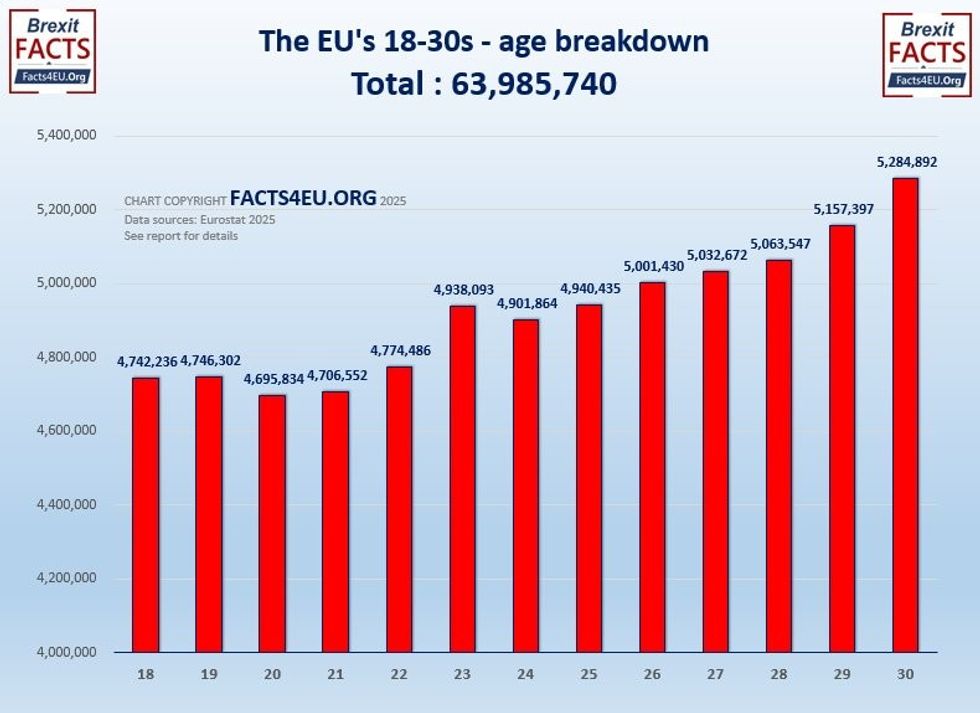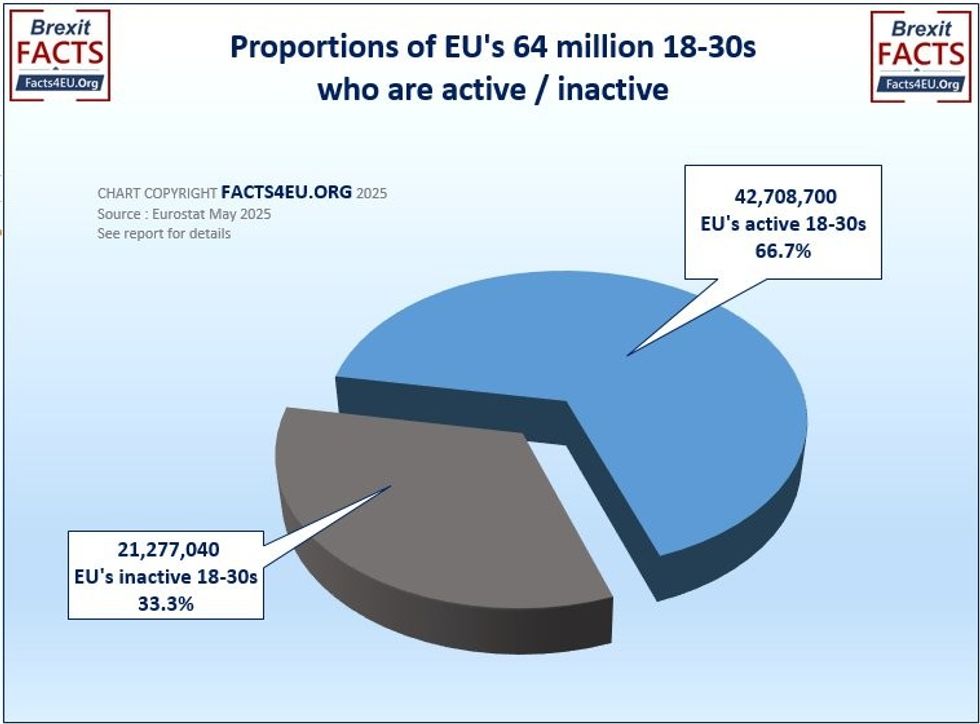Keir Starmer's EU 'surrender summit' risks opening door to MILLIONS, bombshell graphs show

WATCH: Labour should focus on helping British youth, not opening borders, says Matt Goodwin
|GB News

A huge pool of potential migrants could seek opportunities in the UK under a new scheme
Don't Miss
Most Read
Trending on GB News
Sir Keir Starmer's proposed "Youth Experience Scheme" with the EU could have far-reaching implications for Britain's economy and immigration system.
The scheme, which emerged from Monday's "reset" summit with the EU, would potentially open doors to millions of young Europeans aged 18-30.
Research by Facts4EU, shared with GB News, shows there are nearly 64 million people in this age bracket across EU member states, according to data from the EU Commission's official statistics agency.
This represents a significant pool of potential migrants who could seek opportunities in the UK under the new scheme.

Sir Keir Starmer's proposed 'Youth Experience Scheme' with the EU could have far-reaching implications for Britain's economy and immigration system
|Getty/ Facts4EU
The proposal has raised concerns about the impact on Britain's job market, housing, and public services, particularly as the country already grapples with what some describe as a "mass immigration crisis".
The EU's young population is broken down by age as follows: 4.7 million 18-year-olds, 4.7 million 19-year-olds, and similar numbers through each year up to 5.3 million 30-year-olds, totalling 63,985,740 individuals.
Of particular concern is the proportion classified as "inactive" - those neither working, studying, nor seeking employment.
According to the data, over 21 million young Europeans fall into this category, with 16.6 million aged 18-24, nearly 4 million aged 25-29, and about 707,000 aged 30.
This represents approximately one-third of the EU's 18-25 year-olds who are currently "inactive" and potentially available to come to the UK under the proposed Youth Experience Scheme.
While the full details of the scheme have not been released following Starmer's summit, EU documents from April 2024 provide insight into what might be expected.
This is explicitly "NOT a student exchange programme" but would allow EU citizens aged 18-30 to stay in the UK for up to four years.
The EU proposal states: "Mobility would not be purpose-bound, i.e., beneficiaries should be able to undertake different activities during that period, such as studying, training, working or travelling, neither would mobility be subject to a quota system."
LATEST DEVELOPMENTS:

The EU's young population is broken down by age as follows: 4.7 million 18-year-olds, 4.7 million 19-year-olds, and similar numbers through each year up to 5.3 million 30-year-olds, totalling 63,985,740 individuals
|Facts4EU
This suggests participants would have freedom to engage in various activities without restrictions, and notably, the EU has expressed opposition to any quota system limiting numbers.
The financial implications of the scheme could be substantial for British taxpayers.
According to the EU's proposal: "Fees for issuing a visa or residence permit should not be disproportionate or excessive. The UK sponsorship scheme (or a similar scheme) would not apply to the beneficiaries of the envisaged agreement. The same holds for the so-called 'healthcare surcharge'."
This effectively means EU participants would receive free access to the NHS, with costs absorbed by UK taxpayers rather than through the healthcare surcharge currently paid by other migrants.
The EU document notes that standard UK visa fees are "generally high" - £490 for a student visa and between £719 and £1,639 for a skilled worker visa, plus healthcare surcharges of £776-£1,035 per year - but suggests these should be waived or significantly reduced.
The scheme would also require the UK to provide subsidised education for EU students. The EU proposal states: "It would also provide for equal treatment (i.e., non-discrimination) between EU and UK citizens in respect of higher education tuition fees."
This means EU students would pay the same rates as UK students rather than international fees. The difference is substantial - international students typically pay around £22,000 annually, while UK students pay approximately £9,000.
Each EU student would therefore receive an effective subsidy of around £13,000 per year from the British taxpayer. With potentially thousands of EU students taking advantage of this arrangement, the total cost to the education system could run into hundreds of millions of pounds.
Another inequality in the proposed scheme concerns mobility rights.

Of particular concern is the proportion classified as 'inactive' - those neither working, studying, nor seeking employment
|Facts4EU
The EU document explicitly states: "The envisaged agreement would not grant intra-EU mobility rights. The admission of a UK national by a Member State under the envisaged agreement would only be valid for that Member State."
This creates an imbalance where EU participants could live and work anywhere within the UK, while British youth would be restricted to whichever single EU member state admitted them.
The full implications of Starmer's "Youth Experience Scheme" remain to be seen, but the proposal represents a significant shift from his previous position.
The source material notes that the Government "has persistently declined any such 'youth mobility' scheme" prior to now.
Critics may question why the Prime Minister appears to be reversing course on promises not to contemplate such arrangements with the EU.
With Britain already facing what some describe as its "No.1 crisis: mass immigration," the potential influx of young Europeans could exacerbate existing pressures on housing, healthcare, and employment.
The scheme's financial burden on British taxpayers and its apparent imbalance in benefits between EU and UK citizens will likely face scrutiny as more details emerge.
More From GB News










